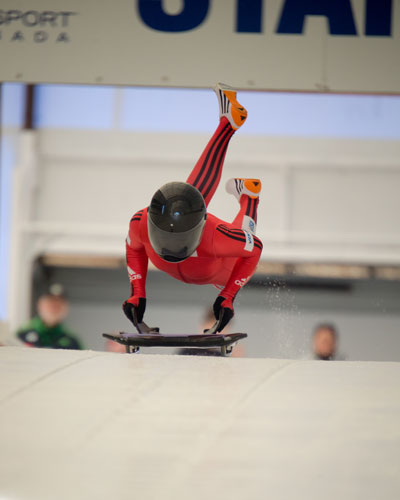
Photo by Ronald LeBlanc
Idyllwild’s Lauren Salter, an international skeleton competitor, has had an exceptional season. With four silver and three bronze medals, this may be her best showing since becoming a slider. But her coaches and teammates can only wonder what she could have achieved had she not incurred a serious injury nearly a year ago.
Salter injured her back lifting weights a year ago. “After two MRIs and a bone scan, no conclusive diagnoses have been made, … It was (and is) one of the worst injuries I’ve had, both pain-wise and in longevity,” she wrote in an email.
No only did she have to stop sliding at the end of the 2013-14 season, but the pain continued through the summer and into fall’s preparation. Nevertheless, Salter was able to finish ninth during the team trials in November. This earned her a place on the North American Cup team.
“I have had to avoid any physical activity since January, and only began jogging in October. The effect my back pain would have on my sliding was such a mystery that my coach and I weren’t optimistic that I would even be able to get down the track come October,” Salter said. “Luckily, I was able to train and compete in U.S. Team Trials, but my lack of fitness and strength was obvious, especially in my start.”
By the end of the season last week, Salter had finished second overall in the North American Cup competition.
“She far exceeded my expectations and surprised me every day with her positive attitude, living in the moment, staying relaxed, showing gratitude for what she could do,” said her coach, Rebecca Sorenson.
Salter had to endure not only the pain, but also the inconveniences of living and competing with it. Life and sport were not normal this season. “Because it’s my upper back, everything involving using my arms hurts, or did hurt, including carrying my sled, pushing, carrying luggage, even cleaning,” she lamented.
In her first race at the Park City, Utah, facility, she finished fourth on the first day and fifth the next.
Then she made substantial strides at the next two events. In late November, she competed in Calgary, Canada, and then in January, she was at the Whistler facility. She earned two silver medals at both competitions. Then last weekend, she got two bronze medals at the final race again at Calgary.
During the spring and summer of 2015, Salter plans to do what she can to repair and improve her back. “I’m not planning on racing any more this season,” she wrote. “My next step will be to recover, rest and get myself back into shape.”
As her back improves and her strength returns, Salter said she will concentrate on improving her race starts and track-driving skills.
“I’ve done better this season as far as studying tracks beforehand, and I look to continue that as I broaden my experience,” she said. “My push start has always been fast, but as the world gets faster, so must I.”
“She learned a valuable lesson this year,” Sorenson said. “Many times athletes only learn these lessons because of an extenuating circumstance. Lauren’s circumstance was an injury to her upper back that completely changed her master plan, training regime, work schedule and finances. She desperately tried to resolve her injury, but to no avail. Doctor after doctor, she searched for answers and came up short of feeling better. Despite this, she worked very hard at what she could do. And she figured out a way to achieve her goals for the season, one day at a time, one run at a time, one step at a time and occasionally one breath at a time.”
And as she improves, Salter remains steadfastly committed to her goal of competing in the 2018 Winter Olympics, which will be February 2018 in Pyeongchang, South Korea.
Skill improvement depends upon restoring her back muscles. But working full time to earn money in order to compete in a sport that lacks the financial resources of track and field reduces her time available to heal.
“I am optimistic that I can recover, despite the ongoing pain. I hope that a spine specialist will be able to give me a different, more positive diagnosis,” she lamented.
But she does have help. Former Idyllwild School Physical Education teacher Holly Guntermann gave a donation that enabled Salter to buy a new sled for this season.
“She’s been incredibly supportive of my athletic abilities since I was in kindergarten, really, and to have that kind of presence in my life has been absolutely incredible,” Salter said of her long-time patron. “Holly was the reason I was able to get a world-class sled, and that has made a huge impact on my down times and comfort on the track.” And despite her debilitating injury, Salter has had her best competitive season.
“She will be a faster, stronger, smarter athlete for the future because of what she learned about herself this year.” Sorenson emphasized. “Second place overall in the [North American Cup] is a huge accomplishment.”
Three years until the Pyeongchang Olympics is a long time in athletics. If Salter can heal and continue to improve, television sets on the Hill will be blaring Korean in 2018.










